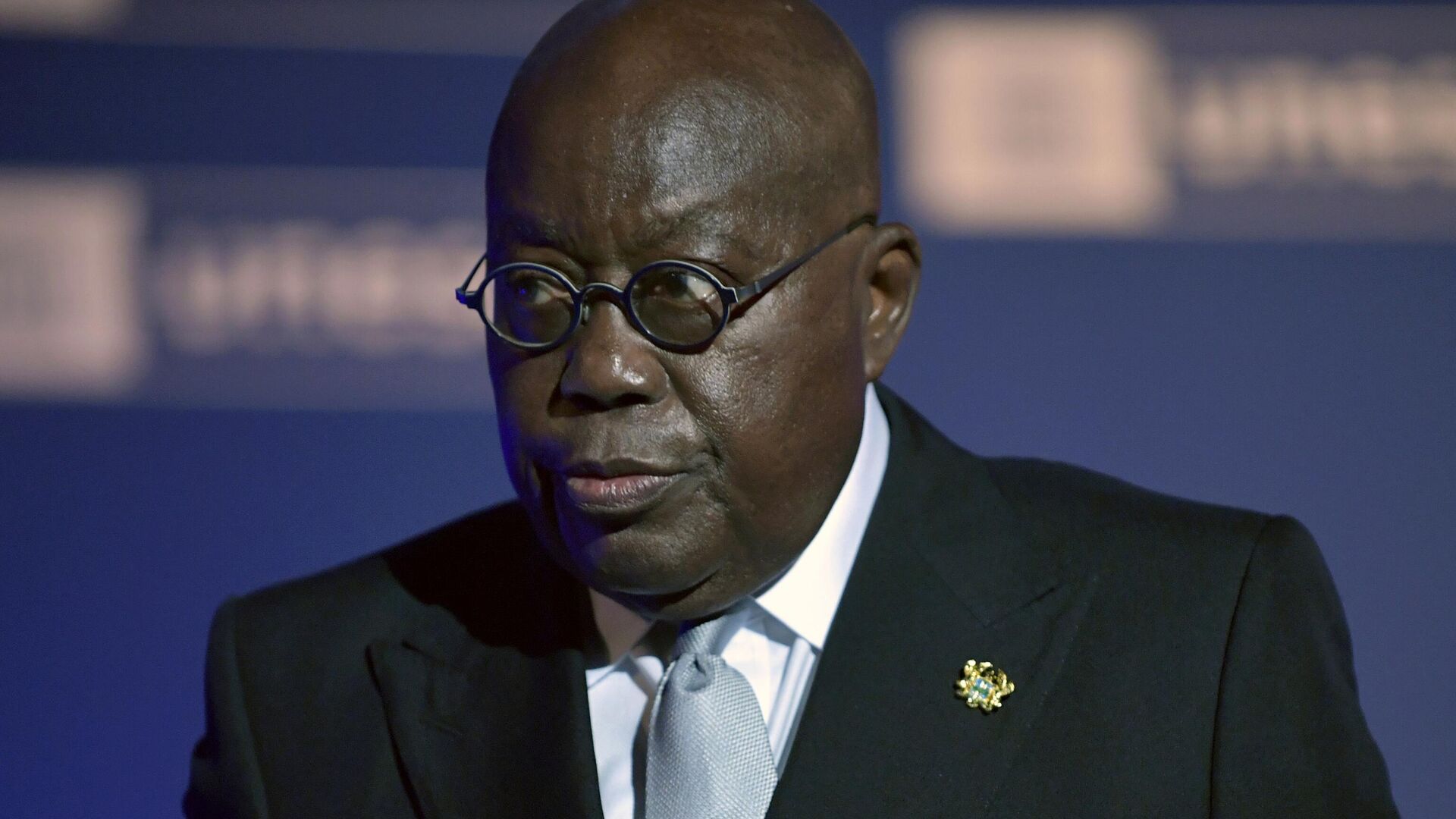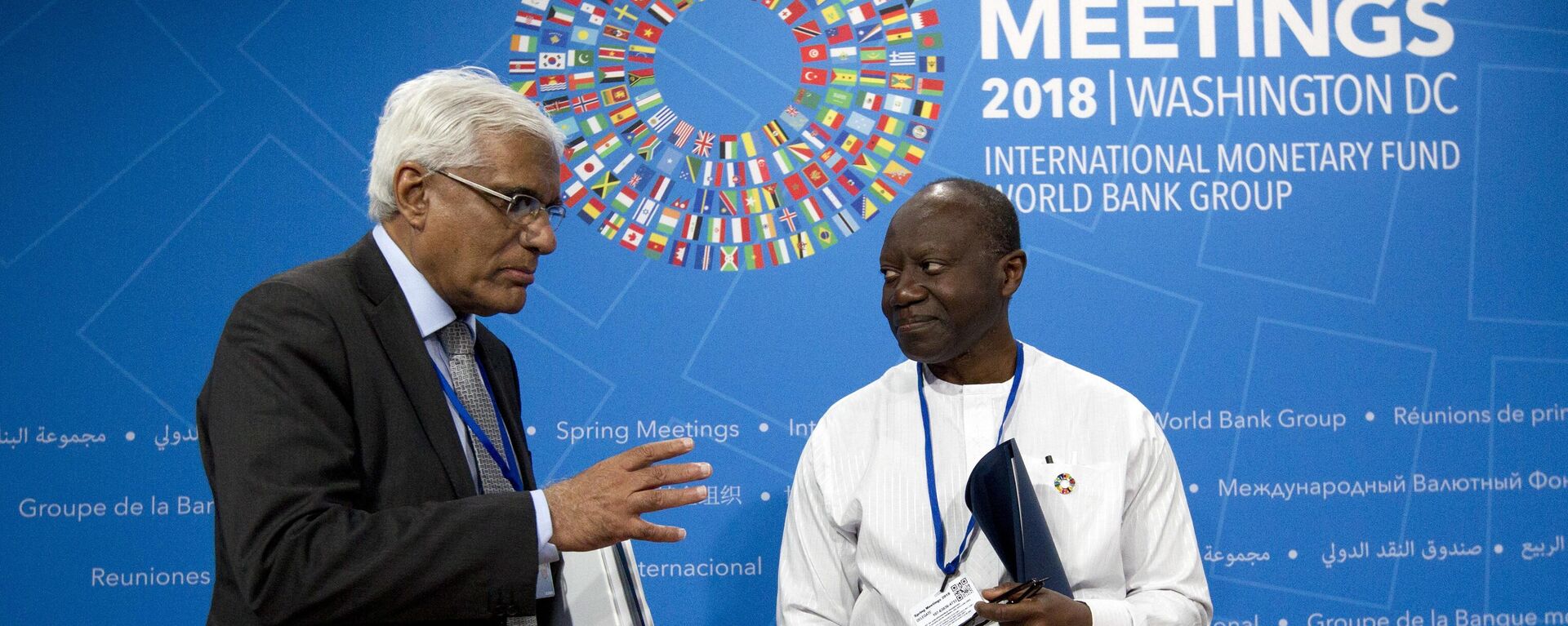https://en.sputniknews.africa/20230620/president-akufo-addo-blames-reckless-credit-rating-agencies-for-ghanas-economic-crisis-1060043044.html
President Akufo-Addo Blames 'Reckless' Credit Rating Agencies for Ghana's Economic Crisis
President Akufo-Addo Blames 'Reckless' Credit Rating Agencies for Ghana's Economic Crisis
Sputnik Africa
In recent years, Ghana's economy has struggled with the fallout from COVID-19, high public debt, rising interest rates, inflation of over 40%, and a decline in... 20.06.2023, Sputnik Africa
2023-06-20T14:28+0200
2023-06-20T14:28+0200
2023-08-03T10:44+0200
sub-saharan africa
west africa
ghana
nana akufo-addo
economic growth
crisis
loan
economy
https://cdn1.img.sputniknews.africa/img/07e7/06/14/1060046045_0:0:3072:1728_1920x0_80_0_0_4c605ffd5ca9620b9b94ee6f8517450c.jpg
Ghanaian President Nana Akufo-Addo has placed the blame for the current economic troubles in Ghana and other African countries on international credit rating agencies.Addressing a gathering at the 30th anniversary celebration of the African Export-Import Bank in Accra, President Akufo-Addo said the continuous downgrading of Ghana's economy by credit rating agencies was "reckless" and not in the best interest of developing countries like Ghana. He emphasized that such ratings put undue pressure on African economies.The president cited Ghana's recent experiences, where downgrades caused a liquidity crisis to become a solvency crisis and shut the nation out of the capital market.Akufo-Addo also called for the creation of local African financial institutions to promote economic growth through domestic resource mobilization and private sector development across the continent.He warned that an over-reliance on foreign capital markets leads to financial leakages, high borrowing rates, and interest payments that undermine the growth of domestic financial institutions and hamper the development of African economies.The president suggested measures that African leaders should take to overcome current economic challenges, including capitalization and effective coordination with the African Union.Ghana is facing an ongoing economic crisis due to high public debt and a drop in cocoa and gold production in the wake of the COVID-19 pandemic. In 2021, the West African nation lost its place as the continent's top gold producer to South Africa.In recent months, however, the country's economy has shown positive signs of stabilization, according to an International Monetary Fund (IMF) mission to Ghana.This followed the IMF's approval of a $3 billion bailout package to support Ghana's economy over the next three years. In addition, the West African country has regained its position as Africa's top gold producer, with a 32% increase in gold production in 2022.
https://en.sputniknews.africa/20230519/ghana--imf-global-markets-crucial-for-african-economies-but-west-is-hypocritical-expert-says-1059347838.html
west africa
ghana
Sputnik Africa
feedback@sputniknews.com
+74956456601
MIA „Rossiya Segodnya“
2023
Muhammad Nooh Osman
https://cdn1.img.sputniknews.africa/img/07e7/04/0a/1058467512_0:0:1280:1280_100x100_80_0_0_ec723833bcbfcaed2e21952965ad99e4.jpg
Muhammad Nooh Osman
https://cdn1.img.sputniknews.africa/img/07e7/04/0a/1058467512_0:0:1280:1280_100x100_80_0_0_ec723833bcbfcaed2e21952965ad99e4.jpg
News
en_EN
Sputnik Africa
feedback@sputniknews.com
+74956456601
MIA „Rossiya Segodnya“
Sputnik Africa
feedback@sputniknews.com
+74956456601
MIA „Rossiya Segodnya“
Muhammad Nooh Osman
https://cdn1.img.sputniknews.africa/img/07e7/04/0a/1058467512_0:0:1280:1280_100x100_80_0_0_ec723833bcbfcaed2e21952965ad99e4.jpg
west africa, ghana, nana akufo-addo, economic growth, crisis, loan, economy
west africa, ghana, nana akufo-addo, economic growth, crisis, loan, economy
President Akufo-Addo Blames 'Reckless' Credit Rating Agencies for Ghana's Economic Crisis
14:28 20.06.2023 (Updated: 10:44 03.08.2023) Muhammad Nooh Osman
Writer/Editor
In recent years, Ghana's economy has struggled with the fallout from COVID-19, high public debt, rising interest rates, inflation of over 40%, and a decline in cocoa and gold production. In May, the IMF approved a $3 billion bailout package to support the country's economy over the next three years.
Ghanaian President Nana Akufo-Addo has placed the blame for the current economic troubles in Ghana and other African countries on international credit rating agencies.
Addressing a gathering at the 30th anniversary celebration of the African Export-Import Bank in Accra, President Akufo-Addo said the continuous downgrading of Ghana's economy by credit
rating agencies was "reckless" and not in the best interest of developing countries like Ghana. He emphasized that such ratings put undue pressure on African economies.
The president cited Ghana's recent experiences, where downgrades caused a liquidity crisis to become a solvency crisis and shut the nation out of the capital market.
The West African leader said that being "the AU [African Union] champion for African financial institutions and leader of a country that recently had to deal with one of the most difficult periods in [its] post-independent history, difficulties that were exacerbated by the reckless behaviour of rating agencies that engaged in pro-cyclical downgrades that shut Ghana out of the capital market and turned a liquidity crisis into a solvency crisis."
Akufo-Addo also called for the creation of local African
financial institutions to promote economic growth through domestic resource mobilization and private sector development across the continent.
He warned that an over-reliance on foreign capital markets leads to financial leakages, high borrowing rates, and interest payments that undermine the growth of domestic financial institutions and hamper the development of African economies.
"Unless we have strong financial institutions, we are not going to develop. We have learnt over the decades that relying on foreign capital is both risky and costly. It has resulted in huge financial leakages to a high cost of default-driven borrowing rates and interest payments and undermines the growth of our financial institutions," the president stated.
The president suggested measures that African leaders should take to overcome current economic challenges, including capitalization and effective coordination with the African Union.
Ghana is facing an ongoing economic crisis due to high public debt and a drop in cocoa and gold production in the wake of the COVID-19 pandemic. In 2021, the West African nation lost its place as the continent's top gold producer to South Africa.
In recent months, however, the country's economy has shown positive
signs of stabilization, according to an International Monetary Fund (IMF) mission to Ghana.
This followed the IMF's approval of a $3 billion bailout package to support Ghana's economy over the next three years. In addition, the West African country has
regained its position as Africa's top gold producer, with a 32% increase in gold production in 2022.



